Der Kletterbaum

Do you want to live in and build a community? We are looking for new members!
We are the Kletterbaum a new intentional community project in the middle of the forest. The basic values we have here can be found below. The most important ones: Living as a community together with nature.
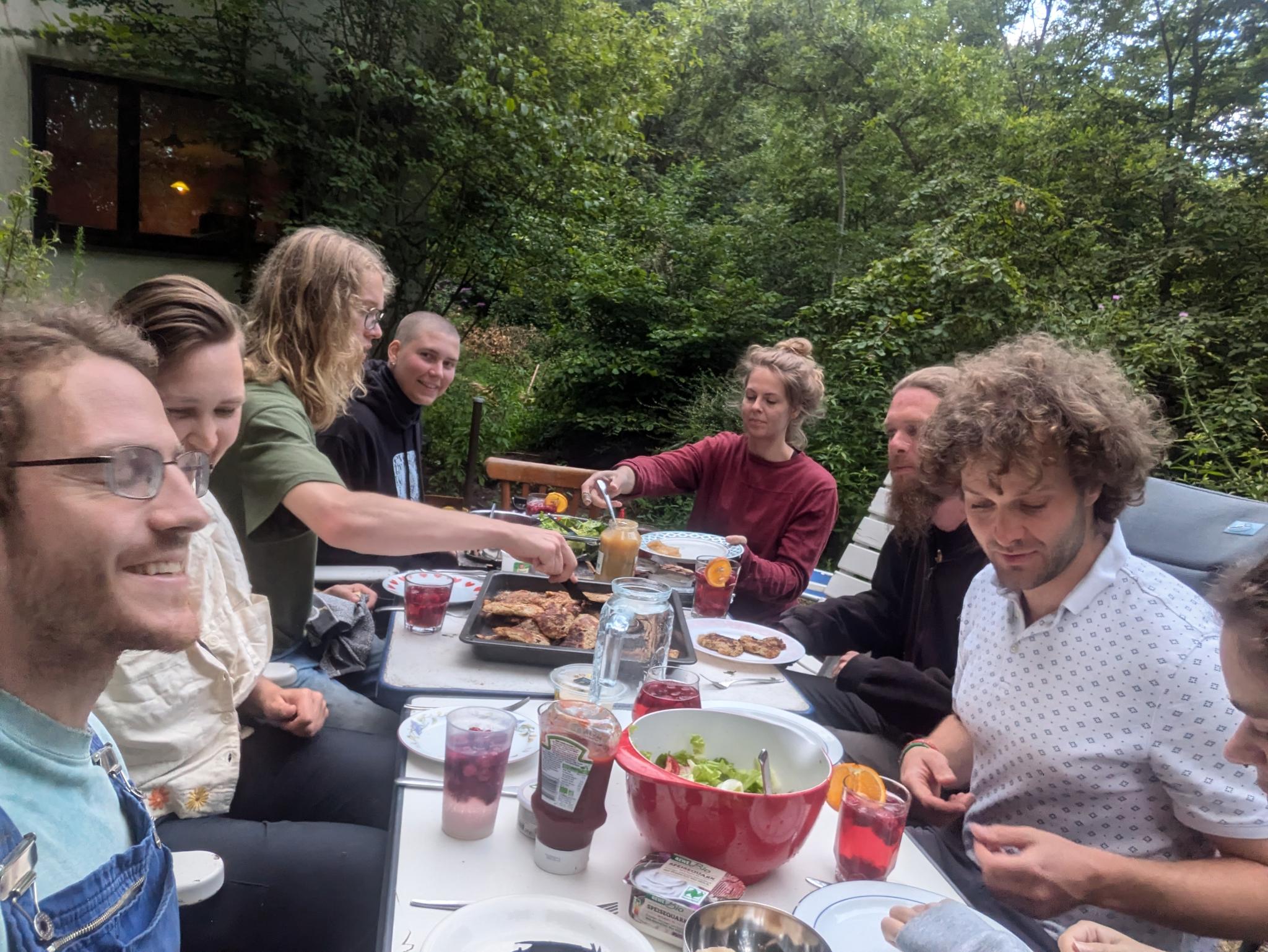

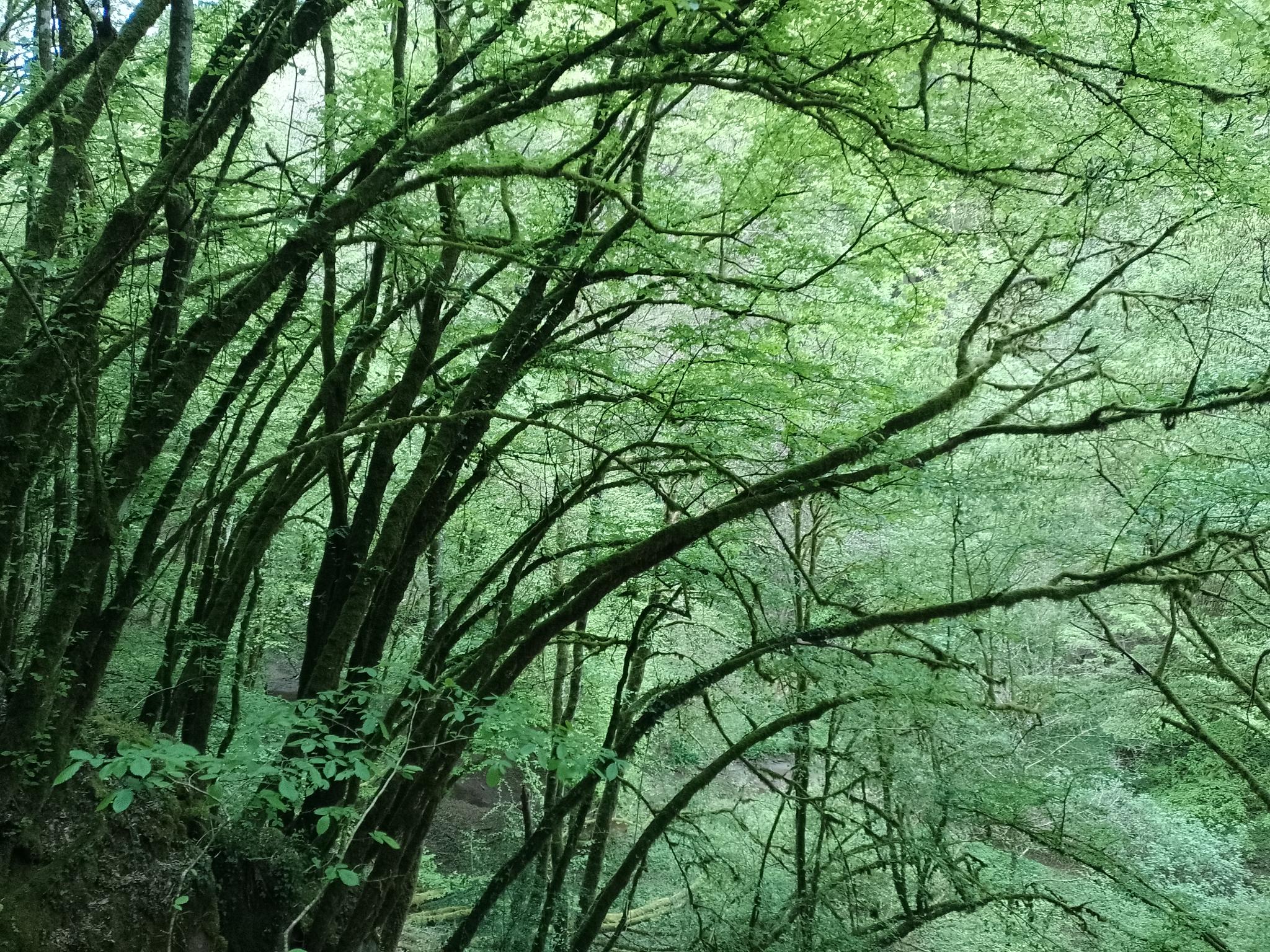
Location
We are located here, north of Trier. It is walking distance from Daufenbach train station and 20 min with the RB22 to Trier Hbf. The track is currently being electrified. They send busses instead during parts of the project, which unfortunateely take 40 minutes instead, see https://www.eifel-strecke.de/.
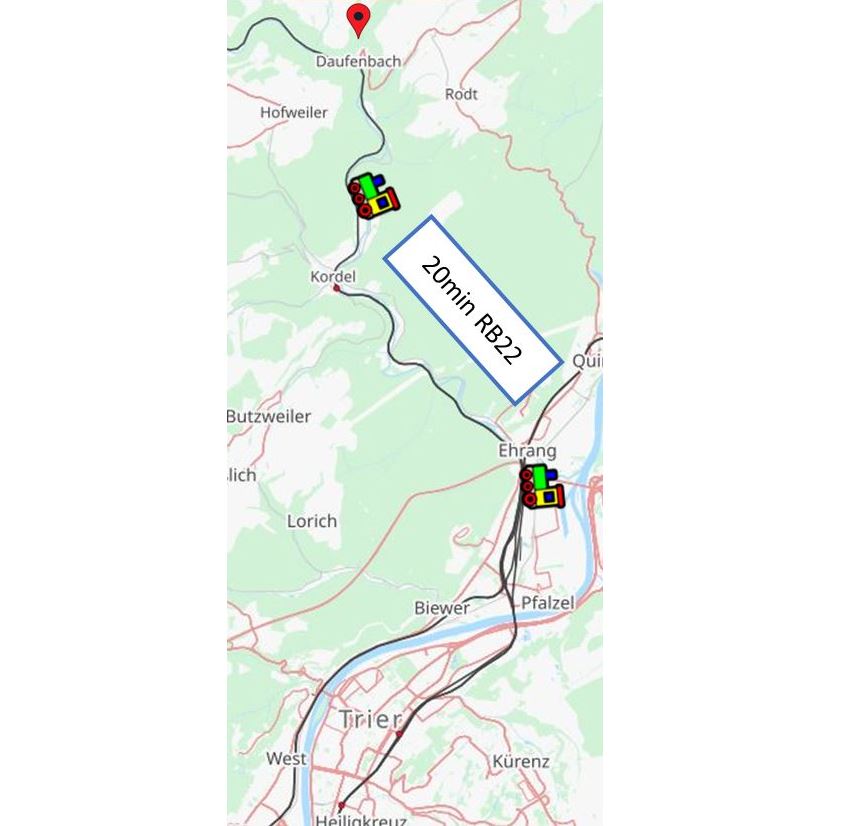

Our place
We live in a villa with the associated gardener house on a total of 450m² building area and with a total of 18,000m² garden and forest. We have space for 7-10 residents when all the rooms are renovated and always have room for guests, friends and events. In the villa we have a large living room, space for a large kitchen, a fireplace room that can be used as a seminar/project/dinner/party room and of course a sauna. The gardener’s house has a nice bathroom and big cellar. In the middle of the forest, cozy, without direct neighbors, surrounded by trees, deer, foxes, butterflies and even some fireflies. Everyone has a private room, these range from 11m² to 25m². All other rooms such as kitchens, bathrooms and toilets are shared. There is plenty of space for everything your heart desires, several terraces and living rooms. We are still at the beginning. After 2 years of part-time renovations, we are now ready for the first people to live here all year round. There is still a lot to do and only together can we make this place beautiful, cozy and a little more modern. Basic services: Heating, internet and water are secured and now it’s a matter of slowly making all the rooms nicer and, for example, installing new kitchens.
Look at pictures here.
Current composition
There are currently three of us in the community and over the summer we have dozens of friends who come to visit from a few days to a few weeks. We are Vera Psychologist, craftswoman and utopian; Jette, Dutch, humanist counselor and nature lover. And Tim, German, IT specialist and construction worker. Both in our mid-30s. Jette & Tim both live in parallel in larger community projects in the Netherlands. A few dozen people from various projects have come over to help build the project as guests. Most of the rooms are still available and have just become habitable!
Who we are looking for
We are looking for people of all ages who are keen, energetic and have the necessary time for such a project and who share our core values. We eat a vegan/vegetarian diet. Ideally, you should already have experience of living in groups and relevant skills, but it is much more important that you are up for it and have the time. Living in community is fun, but it takes time and is not for everyone. Having dinner together, organizing and discussing, maintaining the building and the garden. A full construction/gardening day most weeks and a few evenings a week for eating together and sometimes a meeting is absolute minimum for such a project. It’s the opposite of a functional shared flat.
Unfortunately, we don’t think we (yet) have room for children in the construction phase. We can’t guarantee their needs and safety. But have a look yourself.
Unfortunately, we out of respect for the birds living here no chance to home cats.
Costs
The basic rent per person costs 200-325€ (11m²-25m²). This is debatable, if you can’t afford it let’s talk about it. Service charges are estimated at 180€ per month, which hopefully becomes less with more renovations. Community costs for e.g. grocery shopping and a shared car are added 30€ per month or more depending on what we want to share together.
Want to join?
Are you interested? Write us something about yourself and we will be happy to invite you to get to know us and the project.
We want to get to know you well before we accept you into the community. We also understand that it is difficult to assess what it is like to live in a community and in the forest. Therefore, interested people with whom we would also like to live can try out living with us for 1-2 months.
We look forward to meeting you!
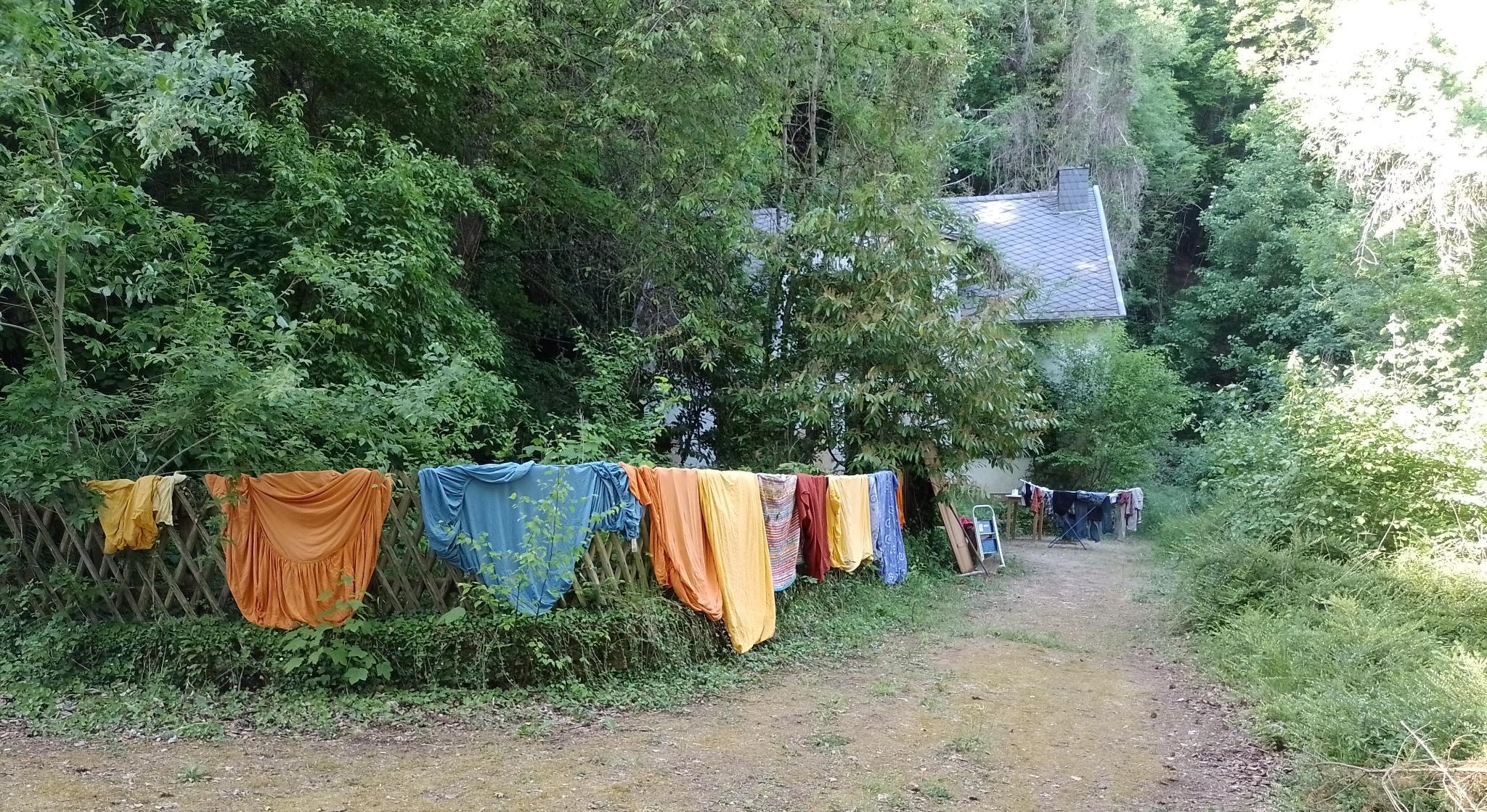
Living in Community
Living together in the forest is pretty cool, but definitely not for everyone.
If it works out, it looks something like this:
- Living with great people
- Lots of space to develop
- Sustainable living
- Live cheaper by sharing
- Waking up every day in paradise surrounded by birds, trees and lots of butterflies and fireflies depending on the season.
But you also need to know that:
- Living in a community requires a lot of communication, willingness for discussions and group processes.
- Living here is almost a part-time job, especially at the beginning. Renovating the building together, holding meetings, making decisions together and organizing things together takes a lot of time. Social things like eating and hanging out together also take time.
- Everyone only has one room as a private area, everything such as bathrooms, kitchens, storage, garden and toilets are shared.
- It takes a moment to get to town or the nearest store.

Vision
Core values form the basis of the community and the goals of the project. We sat down together and asked ourselves what is important to us.
Living as a community
The Kletterbaum is a place for intentional community. A group of people who consciously decide to live together, invest time and energy into the group and the project. This means living with people who are cooking and eating together, who spend time with and support each other. It also means communicating, going through group processes, making decisions and resolving conflicts with each other.
People here are not customers or tenants who are offered a service. At the same time, it’s not a commune or a sect. It’s a group of responsible adults and in the long run maybe also kids sharing a part of their life and space with each other.
Earth care
We live in the forest! Wild animals live in and around this place. The trees have been here longer than we have. The water comes from a well. Here we have the opportunity and responsibility to care for nature in the same way nature cares for us.
We devote time and other resources to live in harmony with the environment. We eat vegetarian/vegan, buy local organic food together and learn and apply permaculture principles. We look for regenerative options, wherever possible.
Openness
We want to create a place that is open and experimental. We want to be a safer space for people and initiatives that contribute to life sustaining systems and practices. We aim to be non-dogmatic and non-judgmental. We want to make room for the extraordinary. Including: music, creativity, play… This means offering this place for related activities and purposes.
Sharing the place
We want to share this place and make it accessible to others. This amazing place has space for guests and events. We create abundance through sharing.
This means we are open to friends coming to visit, to chill here and help out. We share the place with people who want to organize something that is fun, nice for the community, in line with the community values or for the greater good. We set up the place in such a way that it is always possible to host friends. Making the common rooms available regularly for workshops and groups. We also organize things ourselves, such as workweeks, dinners and an annual party.
Connected
The Kletterbaum does not exist in isolation. We are a part of the local villages. We value and maintain our connection to neighbors. This place could not exist without the help and advice of dozens of the people surrounding us. We aim to partake and help at local events. We show the place to people around that are interested. We want to give back to the surroundings. We are also connected to a wider international circle of friends who come and help out. So ideally everyone speaks/learns German and English.
Resilience
Life on earth is endangered by numerous threats, such as disasters caused by the ecological and climate crisis. We want to be a resilient place that prepares for and responds to change. We want this place and community to be healthy and able to last for eternity.
This means we for example having multiple reliable clean water sources. This means being prepared for forest fires or storm. This means working together and setting up the community in a way that it can prevent or recover from internal social struggles or money issues.
Value new initiatives
We support new initiatives. Many communities eventually stagnate, avoid change and move to lower activity levels. We stay intentionally open to initiatives and fresh energy being put in the project. This means supporting somebody organizing a new event, building a pizza oven or building a submarine, even if most of the community is fine the way everything is and doesn’t need it. That also requires taking responsibility. Starting a project means finishing it or at least cleaning up after yourself.
Do It Together
The way of working here is not just DIY (do it yourself) but DIT (do it together). If there are skills we don’t have and we need in this place we learn them. Either by trying them out or by getting training. We share our skills with each other to not have to depend on one person to know or be able to do things.
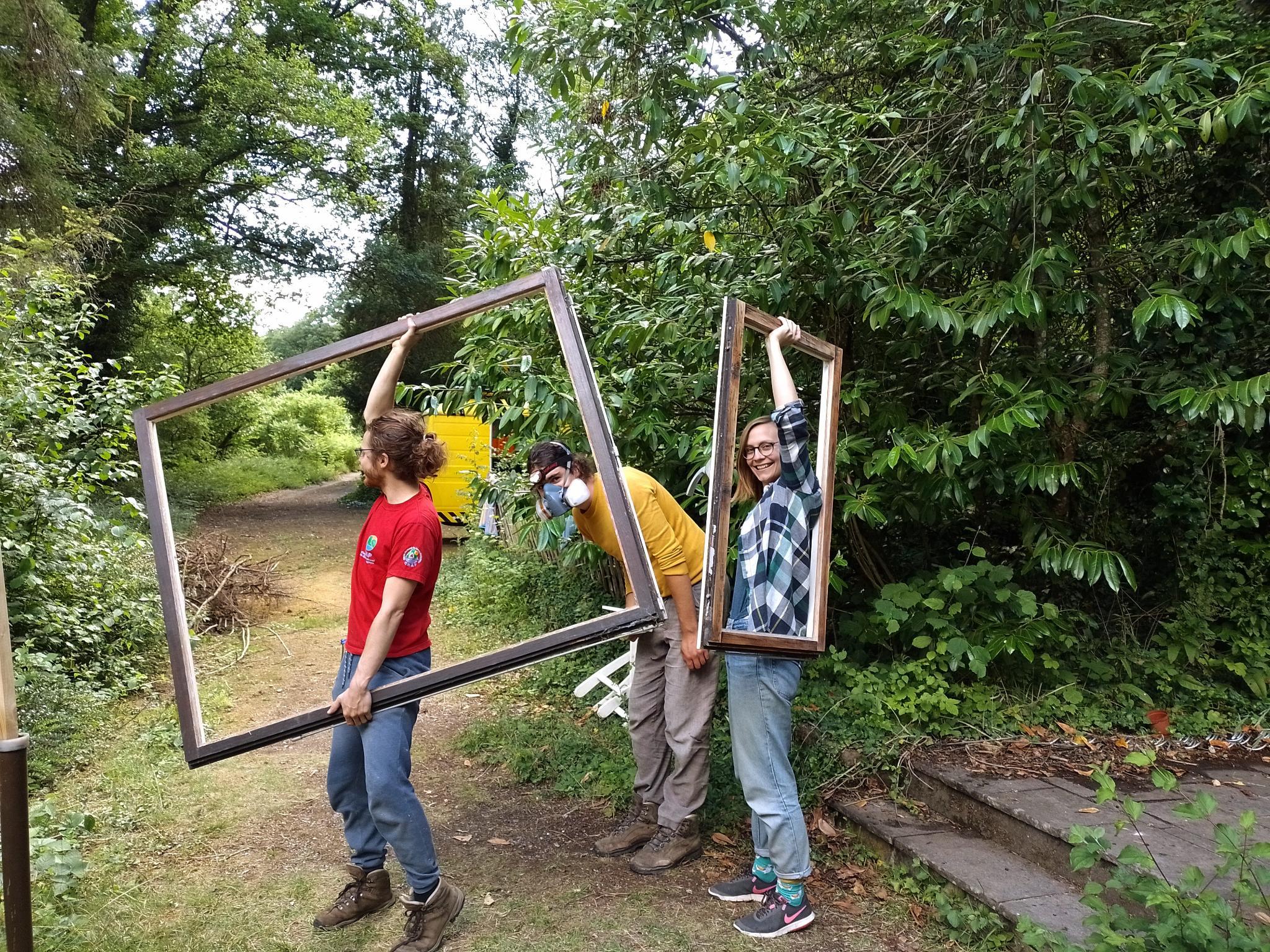
Costs and finances
A side effect of communal living and sharing is that costs are spread, making it possible to live more affordible. This in turn means that people can also live here with a part-time job and thus have more time for their own creativity and projects. This project only came about because we have this free time.
Unfortunately, it is not yet possible to fully estimate how much living here will cost, as this depends a lot on future renovation work and wishes.
The basic principle is clear: as cheap and fair as possible, as expensive as necessary. All finances are always transparent.
The community here is an association that rents the villa and does not own it. The owner runs the project as a non-profit with the aim that the villa remains a non-commercial residential project forever. The rent is based on the costs. All residents pay a membership fee to the residents’ association and thus receive the right to use a room. The association can determine this amount independently, from which communal costs, service costs and the basic rent are paid.
Click here for details
160-230€ till we reach a defined minimum renovation level2026 and then 200-325€ (11m²-25m²)
Initially 160-230€ till we reach a defined minimum renovation level. Then 200-325€ (11m²-25m²)per room basic rent, i.e. excluding ancillary costs. If you convert this to m², it is far below the usual rent level. These are large houses and a large plot of land. That’s why, despite doing a lot yourself, the costs add up. If you can’t afford it, let us know and we’ll see what we can do.
estimated 180€ Service costs
We have costs here for for example electricity, heating material, internet. The good thing is that we divide these costs between many people and get better prices. Unfortunately, the heating costs are high at the beginning of the modernization. This will improve more and more over the years.
It’s estimated to be €180 per month. Hopefully less.
30€ or more communal costs
This is a pot of money that we collect and manage. It is used to pay for small changes, such as wall paint and joint purchases. It can be minimal, such as a new sofa or fridge every now and then, replacing broken lamps or repairing a dripping tap. It can be more, such as buying ecological toilet paper, washing powder or paying for a car together. Or much, much more, such as shared vegetables, bread, beer, bicycles, tools…. Large joint purchases are cheaper.
We have to think about this together Estimates start at €30 per person minimal for essentials and a car.
Background
It’s about living in community. A new community that we are building together. Not just shared living, but an intentional community.
It’s important that people who want to live here understand what living in a community means. It has many advantages, but also limitations. This might be your chance for exactly the life you are looking for.
Here are a few places that have inspired us. Click on the name:
- Example: De Nieuwelaan
- Example: Das Mietshäuser Syndikat, Vrijcoop & Eurotopia
- Example: intentional community advice
Example: The Nieuwelaan
I (Tim) have been living in a housing project in Delft in the Netherlands for years. The Nieuwelaan. There are 12 residents in the house, everyone has their own room and we share the kitchens and bathrooms. My flatmates are like a kind of family. We often cook together and hang out in our kitchen or garden. We support each other when things aren’t going so well. Of course, we are also independent and do our own thing and sometimes spend days alone in our room. We live here because it’s just a lot of fun to live like this and we want to do it together.
We look after our house together and renovate it ourselves. It’s the exact opposite of a functional shared flat, but it’s still affordable. We regularly have small and large parties. I’m having one of the best times of my life here.
Unfortunately, places to live in such projects are limited. That’s why not everyone can live here. We have dozens of applicants when something becomes available.
Everything works relatively well here. The project has existed for ~20 years and is well known. We put a lot of effort into selecting the right people from the applications and integrating them into the group.
Example: Das Mietshäuser Syndikat, Vrijcoop & Eurotopia
One of my hobbies is visiting communities in all their forms, e.g. ecovillages and housing projects.
The Mietshäuser Syndikat in Germany and now also Vrijcoop in the Netherlands are groups that offer a solidarity-based basic structure for housing projects. Their aim is that once a house has been taken out of the commercial rental market, it can never be resold and is thus available forever as communal affordable housing. This is also the aim of this project. 1. non-commercial 2. never to be sold again.
Eurotopia is a directory of communities and housing projects all over Europe. There are many larger projects that, for example, run a farm together or even a whole village. I visited many groups and asked how they work. I have worked in a few groups, mostly as an electrician.
There are many people who have found different ways to live together. Some have their own room, different houses, with or without children. Or people choose to share their money in the community.
Example: Intentional community advice
I help groups around Delft who also want to start housing projects with my accumulated knowledge. Especially with knowledge about financing, accounting and legal structures. A topic that is not so easy for many groups. Existing structures such as banks, the real estate market and authorities etc. are not designed for such projects. Things often go wrong with the financing.
There are people who write naively on Facebook in groups: “Who wants to set up a community in Cologne, for example?” It’s not that simple. There is a lot to clarify in the group and many ideals that cannot be combined.
To summarize briefly, in order to create a community you need the following:
1. motivated people who also want the same thing
2. starting capital and a financing plan
3. an object that is affordable and offers opportunities
I have accompanied a few groups. It’s very easy to find people who want to join an abstract idea of living together if you publicize it accordingly. A group quickly grows to a few dozen members. When it becomes more concrete: In the city/in the country, with children/without, share everything/own kitchen,…. A few fall out. At the latest when it comes to making money available or bidding on a specific property, it becomes too specific and you only have a few people or block each other. That can still be good, because now you have a hard core. These people have found each other. But now this group still has to have enough money ~25% of the total project costs are necessary to obtain financing. The rest can be borrowed from a bank. Even if you have a realistic amount together, you still have to bid on real estate, be faster and be more attractive than the normal luxury apartment building investor. Group processes are never fast. Even cities that sell real estate are rarely willing to work with such groups. I hope that despite these circumstances, many groups will still make it.